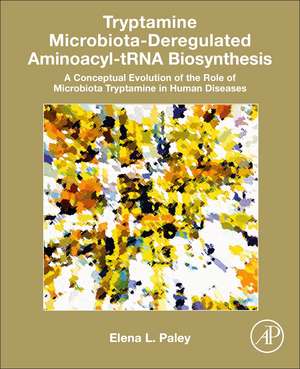Tryptamine Microbiota-Deregulated Aminoacyl-tRNA Biosynthesis: A Conceptual Evolution of the Role of Microbiota Tryptamine in Human Diseases
Autor Elena L. Paleyen Limba Engleză Paperback – 6 iun 2024
This book elucidates the implications of the gut microbiota-mediated tryptamine metabolism for human health, sharing insights into disease etiology, mechanisms, testing, prevention, and treatment. It is an ideal reference for researchers across the biomedical sciences.
- Provides a detailed investigation into tryptamine and its role in human health
- Explores the relationship between microbiome tryptamine metabolome and a range of diseases, including diabetes, cancer, Alzheimer’s disease and Parkinson’s disease
- Considers the role of tryptamine in cell death and the impairment of genome activities
- Paves the way for advances in disease prevention and treatment pathways
Preț: 780.40 lei
Preț vechi: 857.59 lei
-9% Nou
Puncte Express: 1171
Preț estimativ în valută:
149.33€ • 156.33$ • 123.56£
149.33€ • 156.33$ • 123.56£
Carte tipărită la comandă
Livrare economică 31 martie-14 aprilie
Preluare comenzi: 021 569.72.76
Specificații
ISBN-13: 9780443288302
ISBN-10: 0443288305
Pagini: 318
Dimensiuni: 191 x 235 mm
Editura: ELSEVIER SCIENCE
ISBN-10: 0443288305
Pagini: 318
Dimensiuni: 191 x 235 mm
Editura: ELSEVIER SCIENCE
Cuprins
1. Introduction
2. Human gut microbial metabolite tryptamine inducing neurodegeneration causes chromosome and genome instability
3. Mutagenicity and genotoxicity of naturally occurring tryptamines and their principle metabolites
4. Abundant urinary tryptamine as indicator of UTI and nosocomial infections
5. Proteus mirabilis, diseases and tryptamine
6. Microbial tryptophan metabolites in cancer and leishmaniasis
7. The effect of human microbial metabolome on multisensory integration in aging and neurodegenerative diseases
8. Retinitis Pigmentosa (RP): RP-causative gene mutations, RP-related gene mutations, mosaicism and gut microbiome
9. The tRNA aminoacylation interference in diseases
10. Tryptamine interfere with Cytochrome P450
11. Discovery of ADAS and Caudoviricetes prophage markers in metagenomics of type 2 diabetes and associated medical conditions
12. Tryptamine, ADAS and microbiome in Parkinson’s disease
13. Gut microbial ADAS and tryptamine in domestic and agricultural animals
14. Tryptamine, stem cell/progenitor protein biosynthesis and aminoacyl-tRNA biosynthesis
15. Tryptamine metabolite indole-3-acetic acid (IAA) in neurodegenerative diseases and other conditions
16. FDG-PET: tryptamine-treated mouse model and Alzheimer’s disease patients. Conceptual evolution of microbiota tryptamine role in human diseases
17. Epilepsy, tryptamine-induced seizures, malfunction of ion channels, electrolyte abnormalities and antibiotic resistance
18. Conclusions
2. Human gut microbial metabolite tryptamine inducing neurodegeneration causes chromosome and genome instability
3. Mutagenicity and genotoxicity of naturally occurring tryptamines and their principle metabolites
4. Abundant urinary tryptamine as indicator of UTI and nosocomial infections
5. Proteus mirabilis, diseases and tryptamine
6. Microbial tryptophan metabolites in cancer and leishmaniasis
7. The effect of human microbial metabolome on multisensory integration in aging and neurodegenerative diseases
8. Retinitis Pigmentosa (RP): RP-causative gene mutations, RP-related gene mutations, mosaicism and gut microbiome
9. The tRNA aminoacylation interference in diseases
10. Tryptamine interfere with Cytochrome P450
11. Discovery of ADAS and Caudoviricetes prophage markers in metagenomics of type 2 diabetes and associated medical conditions
12. Tryptamine, ADAS and microbiome in Parkinson’s disease
13. Gut microbial ADAS and tryptamine in domestic and agricultural animals
14. Tryptamine, stem cell/progenitor protein biosynthesis and aminoacyl-tRNA biosynthesis
15. Tryptamine metabolite indole-3-acetic acid (IAA) in neurodegenerative diseases and other conditions
16. FDG-PET: tryptamine-treated mouse model and Alzheimer’s disease patients. Conceptual evolution of microbiota tryptamine role in human diseases
17. Epilepsy, tryptamine-induced seizures, malfunction of ion channels, electrolyte abnormalities and antibiotic resistance
18. Conclusions
